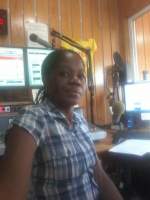- Health and hygiene, schools and other non-household settings
- Health issues and connections with sanitation
- COVID-19 - Corona virus pandemic in relationship to WASH
- Video: Roundtable Discussion on Including Persons Living in Informal Settlements in WASH Responses to COVID-19
Video: Roundtable Discussion on Including Persons Living in Informal Settlements in WASH Responses to COVID-19
3127 views
- Mbirungi
-
 Topic Author
Topic Author- Machrine Birungi is a communications professional, award winning news reporter, writer, and journalist, with a passion for telling stories that help people make informed decisions. She is currently a social media analyst at the Water Supply and Sanitation Collaborative Council in Geneva.
Less- Posts: 42
- Likes received: 17
Video: Roundtable Discussion on Including Persons Living in Informal Settlements in WASH Responses to COVID-19
Dear SuSanA colleagues, partners,
Further to the online roundtable organized by WSSCC, OHCHR and WaterAid on 23 July, I would like to share the video recording: Including persons living in informal settlements in WASH responses to COVID-19 to Leave No One Behind < >
Over 570 persons from all over the world registered, and over 270 logged in. With the excellent moderation of Ms. Rose Osinde Alabaster, sixteen grassroots representatives of vulnerable groups/ key populations living in informal settlements from Bangladesh, DRC, Kenya, India, Pakistan, Romania and Uganda, explained how COVID-19 and related responses are affecting them, and made precise recommendations to States, UN, development partners and donors, to adequately address their specific and diversified challenges and needs. Mr. Balakrishnan Rajagopal, UN Special Rapporteur on adequate housing also participated in the meeting along with government officials, UN agencies, and human rights, gender organizations and WASH and development partners.
A report is being prepared and will be shared in late August/ early September. Please watch and share the video widely in your networks. Do not hesitate to share your comments or recommendations, if any, to enrich the discussion and the final report further.
Please note that this online roundtable is part of the WSSCC Leave No One Behind in WASH programme, developed in partnership with OHCHR. It built on previous joint WSSCC/OHCHR roundtables:
* 22 October 2019 in New York, Interdependencies between the Human Rights to Water and Sanitation and other human rights, especially for specific left behind individuals and groups ( www.dropbox.com/s/er5s47wtkkmqyo6/WSSCC%...Edit%202019.mp4?dl=0 ),
* 6 March 2020, Interdependencies between water, sanitation and other human rights: strengthening States accountability through HRC/ VNR to LNOB in SDG 6 ( www.wsscc.org/sites/default/files/upload...mit-Report-FINAL.pdf )(Palais Wilson, Geneva).
You can find here more information on the Leave No One Behind in WASH series here
including the Leave No One Behind consultations on the contribution of the
Swachh Bharat Mission towards achieving SDG 6 here , whose report forms the WSSCC input in the UNCT contribution to the 2020 Voluntary National Review report of India on SDG 6.
For more information contact: Enrico Muratore Aprosio, Technical Expert -Leave No One Behind/Equality andNon-Discrimination/Gender, Water Supply and Sanitation CollaborativeCouncil (WSSCC) – This email address is being protected from spambots. You need JavaScript enabled to view it.
Further to the online roundtable organized by WSSCC, OHCHR and WaterAid on 23 July, I would like to share the video recording: Including persons living in informal settlements in WASH responses to COVID-19 to Leave No One Behind < >
Over 570 persons from all over the world registered, and over 270 logged in. With the excellent moderation of Ms. Rose Osinde Alabaster, sixteen grassroots representatives of vulnerable groups/ key populations living in informal settlements from Bangladesh, DRC, Kenya, India, Pakistan, Romania and Uganda, explained how COVID-19 and related responses are affecting them, and made precise recommendations to States, UN, development partners and donors, to adequately address their specific and diversified challenges and needs. Mr. Balakrishnan Rajagopal, UN Special Rapporteur on adequate housing also participated in the meeting along with government officials, UN agencies, and human rights, gender organizations and WASH and development partners.
A report is being prepared and will be shared in late August/ early September. Please watch and share the video widely in your networks. Do not hesitate to share your comments or recommendations, if any, to enrich the discussion and the final report further.
Please note that this online roundtable is part of the WSSCC Leave No One Behind in WASH programme, developed in partnership with OHCHR. It built on previous joint WSSCC/OHCHR roundtables:
* 22 October 2019 in New York, Interdependencies between the Human Rights to Water and Sanitation and other human rights, especially for specific left behind individuals and groups ( www.dropbox.com/s/er5s47wtkkmqyo6/WSSCC%...Edit%202019.mp4?dl=0 ),
* 6 March 2020, Interdependencies between water, sanitation and other human rights: strengthening States accountability through HRC/ VNR to LNOB in SDG 6 ( www.wsscc.org/sites/default/files/upload...mit-Report-FINAL.pdf )(Palais Wilson, Geneva).
You can find here more information on the Leave No One Behind in WASH series here
including the Leave No One Behind consultations on the contribution of the
Swachh Bharat Mission towards achieving SDG 6 here , whose report forms the WSSCC input in the UNCT contribution to the 2020 Voluntary National Review report of India on SDG 6.
For more information contact: Enrico Muratore Aprosio, Technical Expert -Leave No One Behind/Equality andNon-Discrimination/Gender, Water Supply and Sanitation CollaborativeCouncil (WSSCC) – This email address is being protected from spambots. You need JavaScript enabled to view it.
Machrine Birungi
Communications Analyst/ Social media
LinkedIn Profile: bit.ly/2yoThea
Communications Analyst/ Social media
LinkedIn Profile: bit.ly/2yoThea
Please Log in to join the conversation.
You need to login to reply
Share this thread:
- Health and hygiene, schools and other non-household settings
- Health issues and connections with sanitation
- COVID-19 - Corona virus pandemic in relationship to WASH
- Video: Roundtable Discussion on Including Persons Living in Informal Settlements in WASH Responses to COVID-19
Recently active users. Who else has been active?
Time to create page: 0.140 seconds







